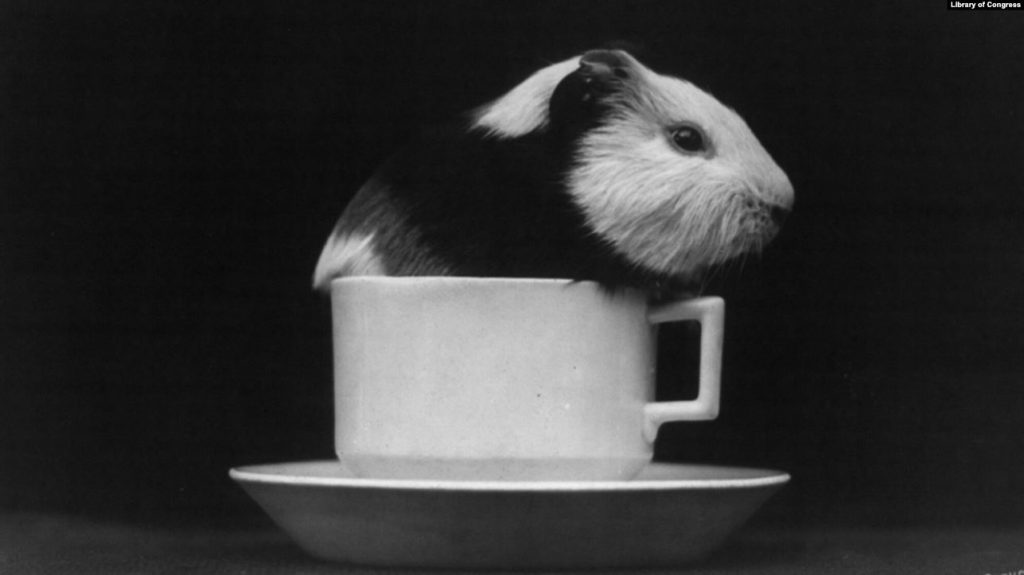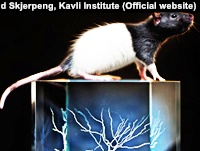پادکست VOA: اصطلاحات انگلیسی – موش آزمایشگاهی
سلام با هفتاد و دومین قسمت از مجموعه “Words and Their Stories” (کلمات و داستان آن ها) از سری پادکستهای VOA در خدمت شما هستیم. این مجموعه پادکست با لهجه آمریکایی به توضیح اصطلاحات رایج زبان انگلیسی، داستان ایجاد شدنشون و نحوه استفاده از آن ها در مکالمه می پردازه. در این قسمت از پادکست VOA: اصطلاحات انگلیسی – موش آزمایشگاهی قراره با کاربرد و معنی اصطلاح “Guinea pig” (به معنی خوکچه هندی) آشنا بشی. در کنارش چندین اصطلاح و کلمه ی جالب و کاربردی دیگه هم یاد میگیری که لیست این کلمه ها به همراه معنی اون ها در پایان مطلب قرار گرفته.
اصطلاح “Guinea pig” (به معنی خوکچه هندی) که تو فارسی بهش “موش آزمایشگاهی” میگیم، به کسی گفته میشه که قراره روش یه ایده جدید یا یه پروژه جدید تست بشه. مثلا اگه یه نفر یه غذای جدید که تاحالا تست نکرده درست کنه و تو اولین نفری باشی که اون رو می خوری تا ببینی خوشمزه است یا نه، درواقع یه “Guinea pig” یا موش آزمایشگاهی هستی.
VOA – Words and Their Stories – 72: ‘Guinea Pigs: Useful in Research, Conversation’

متن انگلیسی پادکست VOA: اصطلاحات انگلیسی – موش آزمایشگاهی :
Now, the VOA Learning English program Words and Their Stories.
Each week, we explain where American English expressions come from and how to use them.
Today, we turn once again to the animal world. We talk about an animal that has been a great service to humanity: the Guinea pig.
Guinea pigs are native to South America. Some people say the small, very social creatures got their name from the fact that they make noises like a pig. Another reason, they say, is that guinea pigs first left their homeland on ships that sailed between South America, Guinea and Britain.
Other experts suggest that guinea pigs look like the young of another animal: the Guinea hog, also called the “river pig.”
Over the years, guinea pigs have earned our respect. They have, after all, played an important part in keeping people healthy.
For two centuries, they have been used for medical research. Their natural defenses against disease are similar to that of human beings. Scientists used guinea pigs in early studies of infectious diseases, such as tuberculosis and diphtheria. Today they are often used in studies of sexually transmitted and other infectious diseases.

Rats are also used for laboratory experiments. But, as it turns out, Guinea pigs have more in common with people than rats do. So they are a better choice for some studies.
These experiments have led to the use of “guinea pig” in the English language.
Some say that the term guinea pig, meaning “one subjected to an experiment,” was first used in the 1920s. And this expression is still very common today.
If someone calls me a “guinea pig,” it means that new ideas or methods are tested on me. I am part of some kind of experiment and it does not have to be one in a laboratory.
Let’s hear this expression used in some examples.
I have some new dishes to serve at my big dinner party! But I’ve never made them before. What if they don’t taste good?
How about if I come over this weekend and you can cook them for me?
Great idea! You can be my guinea pig!
You can call me whatever you want. As long as I get to eat your great cooking!
This milk smells funny. Will you try it and see if it’s old?
Ew. No! I’m not your guinea pig. Try it yourself!
The city government is trying out a new recycling program. It is the first of its kind in the nation.
Argh. Not again! Why must our city be a guinea pig for every ‘great’ idea our politicians hear about? And yes, I said ‘great’ with quotes because they’re not great at all!
Yes. I heard your quotation marks.
Good.
The expression, “guinea pig” carries a lot of meaning with only two words. Calling yourself a “test subject,” sounds way too scientific. And we just do not use it that way.
A similar term, “lab rat,” is rarely used and it does not sound very nice. And saying that you “are being experimented on to see if something works” is so very…long.
Guinea pig is much more common and you can use it in any situation.
Well, the only time you may not want to use “guinea pig’” to mean a lab animal, is when speaking to someone from PETA, People for the Ethical Treatment of Animals. They may not like it.
Another person who may not like this expression is someone who takes care of one as a pet. That’s right. These animals do much more than help in scientific research. In the United States, many people own one or more guinea pigs, much like you would a dog or cat!
And that’s all the time we have for Words and Their Stories.
Until next time! I’m Anna Matteo.
Dr. Heckyll is his own little guinea pig
‘Cause they all think he’s mad
Sets his sights on the search of a lifetime
And he’s never, never sad
Whoa oh, its off to work he goes
In the name of science and all its wonders …
Do you use the term “guinea pig” the same way in your language? Or do express this meaning a different way? Let us know in the Comments Section.
لیست واژگان این پادکست
recycling (بازیافت کردن)– v. to process (something, such as liquid body waste, glass, or cans) in order to regain material for human use
ethical (اخلاقی)– adj. following accepted rules of behavior : morally right and good
امیدوارم از پادکست VOA: اصطلاحات انگلیسی – موش آزمایشگاهی لذت برده باشید. برای دسترسی به قسمت های دیگر این پادکست می توانید از صفحه ی پادکست VOA – اصطلاحات انگلیسی آکادمی مجازی آموزش زبان ۲۴talk دیدن کنید.
همچنین برای گوش دادن به پادکست های سطح بندی شده British Council می توانید به صفحه ی پادکست British Council آکادمی مجازی آموزش زبان ۲۴talk یا برای گوش دادن به پادکست های BBC به صفحه ی پادکست ۶ دقیقه انگلیسی (BBC) آکادمی مجازی آموزش زبان ۲۴talk مراجعه کنید.
گوش دادن به پادکست روش خوبی برای تقویت مهارت شنیداری و هم چنین یادگرفتن کلمات در بستر یک موضوع خاصه که این به تقویت مهارت مکالمه انگلیسی نیز کمک زیادی می کنه.
اگه دنبال این هستی که مهارت های مکالمه زبان انگلیسیت رو بیشتر از این تقویت کنی بهت پیشنهاد میکنم در دورهی مکالمه زبان انگلیسی آکادمی مجازی آموزش زبان انگلیسی ۲۴talk شرکت کنی که با یه برنامه منسجم و خلاقانه کمک میکنه در زمان کوتاه بتونی به راحتی و روانی انگلیسی صحبت کنی.







